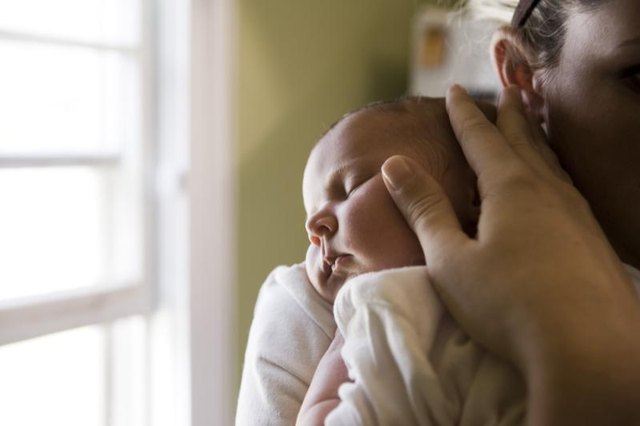
The sleeping habits of a newborn are often unpredictable, with your baby dozing off for 30 minutes or one, two or three hours at a time during the day and the night. According to Jodi Mindell of the National Sleep Foundation, your infant's sleep cycle may become slightly more predictable between the ages of four and six weeks. Your 5-week-old infant still needs an abundance of sleep–anywhere from 10 1/2 to 18 hours, says the NSF.
How Your Baby Sleeps
Babies younger than 6 months of age spend 50 percent of their time in "active" or nonrapid-eye-movement sleep and 50 percent REM or "quiet" sleep, according to a January 2001 "American Family Physician" article. Your 5-week-old's sleep cycle is much shorter than that of an adult. Her sleep cycle consists of about 50 minutes of non-REM sleep and REM sleep, which accounts for her frequent awakenings. Additionally, your baby doesn't start to develop a perception of daylight and night until 6 weeks of age, at which point her circadian rhythms begin to develop–as well as promise of more predictable sleep.
Your Baby's Schedule
During the first few weeks of your newborn's life, you have little control over when and how long she sleeps, says Mindell, who also points out some babies seem to sleep more during the day and less at night. From ages 4 to 6 weeks, you may notice your baby is developing a specific pattern of sleep. Mindell advises paying close attention to the times your child naps during the day and when she sleeps at night–however, this won't be consistent from one day to the next, she says.
Predictable Sleep
Once your baby reaches the age of 3 months, she may sleep in longer stints, says Kids Health, as much as five hours at a time. When she reaches the half-year marker, when middle-of-the-night feedings aren't needed, she may sleep anywhere from nine to 12 hours during the night. According to the NSF, an infant from the ages of 3 to 11 months still needs ample amounts of sleep. In addition to nightly sleep, your child takes one to four naps during the day that can last from a half-hour to two hours.
Get Your Baby to Sleep
Your 5-week-old infant tells you she's sleepy in a number of ways, says the NSF. She may rub her eyes, fuss or cry. Pay attention to your infant's cues. The NSF advises putting your baby in her crib not when she's completely asleep, but when she's just about to doze off. This strategy helps him develop self-soothing techniques. Encourage longer nighttime sleep by keeping your 5-week-old engaged during the day. The AAP suggests you talk and play with your child during the day; expose her to the usual hustle-bustle of your household. Make night time calmer, quieter and dimmer. According to Mindell, by the time your baby is 8 to 12 weeks old, you should have a set schedule in place, with nap times and bedtimes at the same time every day. If your infant starts getting sleepy by 7:30, don't delay bedtime, she advises.
Tips for Parents
If your 5-week-old's sleep schedule has you in a state of sleep deprivation, this is all part of becoming a new parent. There are some tips that can help maximize your own sleep. Sleep when your baby sleeps. Turn off the phones and put the housework on hold. Postpone playing host to visiting family members and friends; ask them to watch your baby while you get some nap time. Split caretaking duties with your spouse or partner so that both of you get at least five hours of uninterrupted sleep every night, Mindell advises. It's OK to take your baby into your own bed when you breastfeed or bottle-feed, but put her in her own crib; never fall asleep with your child in your own bed. Finally, don't rush to your infant if she continues to fuss when you put her to bed, says the AAP. Wait a few minutes to see if she falls asleep on her own.





No comments:
Post a Comment